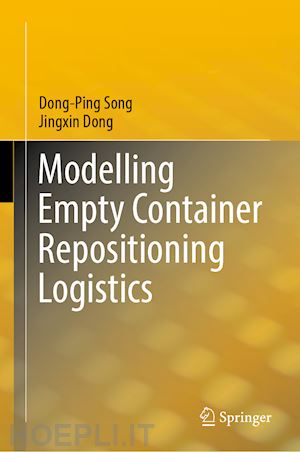
Questo prodotto usufruisce delle SPEDIZIONI GRATIS
selezionando l'opzione Corriere Veloce in fase di ordine.
Pagabile anche con Carta della cultura giovani e del merito, 18App Bonus Cultura e Carta del Docente
The book takes the inventory control perspective to tackle empty container repositioning logistics problems in regional transportation systems by explicitly considering the features such as demand imbalance over space, dynamic operations over time, uncertainty in demand and transport, and container leasing phenomenon. The book has the following unique features. First, it provides a discussion of broad empty equipment logistics including empty freight vehicle redistribution, empty passenger vehicle redistribution, empty bike repositioning, empty container chassis repositioning, and empty container repositioning (ECR) problems. The similarity and unique characteristics of ECR compared to other empty equipment repositioning problems are explained. Second, we adopt the stochastic dynamic programming approach to tackle the ECR problems, which offers an algorithmic strategy to characterize the optimal policy and captures the sequential decision-making phenomenon in anticipation of uncertainties over time and space. Third, we are able to establish closed-form solutions and structural properties of the optimal ECR policies in relatively simple transportation systems. Such properties can then be utilized to construct threshold-type ECR policies for more complicated transportation systems. In fact, the threshold-type ECR policies resemble the well-known (s, S) and (s, Q) policies in inventory control theory. These policies have the advantages of being decentralized, easy to understand, easy to operate, quick response to random events, and minimal on-line computation and communication. Fourth, several sophisticated optimization techniques such as approximate dynamic programming, simulation-based meta-heuristics, stochastic approximation, perturbation analysis, and ordinal optimization methods are introduced to solve the complex stochastic optimization problems.
The book will be of interest to researchers and professionals in logistics, transport, supply chain,and operations research.
Dr Dong-Ping Song is a professor of Supply Chain Management in the School of Management at the University of Liverpool. He is a Senior Member of IEEE; an Associate Editor for Transportation Research Part E and International Journal of Shipping and Transport Logistics. His research interests include the applications of mathematical modeling, data analytics, artificial intelligence, and simulation-based tools to various supply chain, logistics, and transportation systems, particularly in the area of maritime transport. He has published four books titled as “Optimal Control and Optimization of Stochastic Supply Chain Systems” by Springer (ISBN 9781447147237); “Optimising Supply Chain Performance: Information Sharing and Coordinated Management” by Palgrave Macmillan (ISBN 9781137501134); "Container Logistics and Maritime Transport" by Routledge (ISBN 9780367336509); and "Dual-Channel Supply Chain Decisions with Risk-Averse Behaviour" by World Scientific Publishing (ISBN 9781800610392).He has had papers published in international journals including IEEE Transactions on Automatic Control, Transportation Research Part B/E/D, European Journal of Operational Research, and Naval Research Logistics.
Dr Jing-Xin Dong is a professor of Operations Management and Supply Chain Management at Newcastle University Business School, UK. His research interests include operations research, port and shipping management, intelligent logistics and transport, and GPS/GIS. He is an associate editor for IET Intelligent Transport System and a member of Editorial Board for European Management Journal. He has co-authored a chapter “Empty Container Repositioning” in the book "Handbook of Ocean Container Transport Logistics" published by Springer (ISBN 9783319118901). He has published papers in Transportation Research Part B/E/D, European Journal of Operational Research, International Journal of Production Economics, Annals of Operations Research, etc.











Il sito utilizza cookie ed altri strumenti di tracciamento che raccolgono informazioni dal dispositivo dell’utente. Oltre ai cookie tecnici ed analitici aggregati, strettamente necessari per il funzionamento di questo sito web, previo consenso dell’utente possono essere installati cookie di profilazione e marketing e cookie dei social media. Cliccando su “Accetto tutti i cookie” saranno attivate tutte le categorie di cookie. Per accettare solo deterninate categorie di cookie, cliccare invece su “Impostazioni cookie”. Chiudendo il banner o continuando a navigare saranno installati solo cookie tecnici. Per maggiori dettagli, consultare la Cookie Policy.